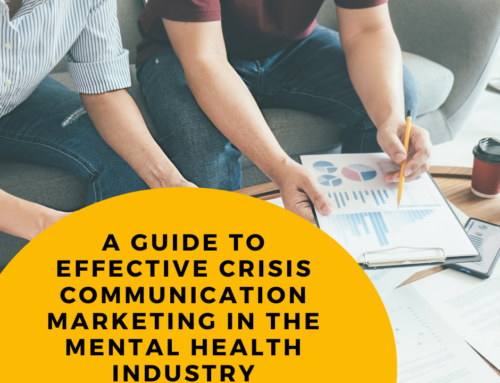In the ever-evolving mental and behavioral healthcare world, marketing services are crucial in connecting providers with those who need help. However, this delicate task comes with its unique set of challenges, primarily revolving around mental health care marketing and privacy. As a provider, how do you balance the need to promote your services while ensuring the privacy and trust of your clients? This blog post navigates the murky waters of privacy and mental health marketing, providing insights and best practices to follow.
Navigating Privacy Concerns in Marketing

Modern marketing strategies in the mental health industry stretch beyond traditional methods, incorporating digital platforms, apps, and other technologies to reach a wider audience. The Consumer Reports investigation revealed that many privacy policies do not adequately explain what types of health data could be shared or utilized. This lack of transparency raises alarm bells for clients who trust providers with sensitive information.
Marketing strategies also increasingly leverage geo-personalization, which does not involve sharing patient information related to mental wellness interventions, thereby having no impact on privacy. However, while geo-personalization may not conflict with HIPAA regulations, it brings about its own set of privacy concerns. Providers may unknowingly cross boundaries without clear guidelines, potentially damaging client trust.
Mental health marketers are encouraged to adopt secure technologies, establish transparent marketing practices and privacy policies, respect client boundaries, and avoid potentially distressing content to navigate these privacy concerns. Striking a balance between effective strategy and upholding privacy can be challenging, yet it is paramount for the success of any strategy.
One cannot overemphasize the importance of privacy in marketing in the healthcare field. It is the cornerstone of trust between providers and their clients, instrumental in successful outcomes. Therefore, marketers must understand the intricacies of privacy concerns and navigate them with utmost care and respect for their clients.
Why Privacy Matters in Health Marketing & The Role of HIPAA
Privacy is not just a legal requirement in marketing for mental health; it is the bedrock upon which client trust is built. Clients trust health providers with their most intimate thoughts, feelings, and experiences. Maintaining this trust requires stringent privacy measures, ensuring that personal health information is kept confidential and protected.
The advent of digital mental health services for various health conditions has further complicated the privacy landscape. It can be difficult to ascertain where the data is going and who has access to it when dealing with sensitive information in digital health services, such as if one feels suicidal or what medications they are taking. This uncertainty underscores the need for robust privacy measures in marketing.
One of the critical instruments in maintaining privacy in marketing health care is the Health Insurance Portability and Accountability Act (HIPAA). HIPAA regulations ensure mental health professionals maintain client confidentiality and protect personal health information. This includes safeguards against unauthorized access to client data, whether in transit or at rest.
Telepsychology or telemental health therapy (TMHT) is another aspect of mental health services that need special attention regarding privacy. Mental healthcare providers must be aware of the limitations of confidentiality in email use and the risks, benefits and those who may have access to them, especially when using health-related websites. Health providers may be tempted to utilize fingerprint or facial recognition to secure their phones. While convenient, these methods may not provide the security to protect client data.
Best Privacy Practices for Marketing Behavioral Health Services

Firstly, adopting secure technologies is crucial. This can include using encrypted email services and HIPAA-compliant software. These technologies can help protect client data during transmission and storage, reducing the risk of unauthorized access or data breaches.
In addition to using secure technologies, implementing transparent marketing practices and privacy policies is equally important. Transparency in marketing practices can foster client trust, bolster brand loyalty, and avert potential legal issues associated with false advertising or deceptive claims. Moreover, clear and comprehensive privacy policies can provide clients with the necessary information about how their data is used and protected. By adopting these practices, mental health providers can meet regulatory requirements and build stronger, more trusting relationships with their clients in their mental health practice.
Adopt Secure Technologies
From secure email platforms and encrypted messaging apps to telepsychology/telemental health therapy, these technologies offer many ways to connect with clients while ensuring their privacy. However, using these technologies does come with its set of challenges. For instance, while convenient, email communication can pose potential limitations to confidentiality. In-transit encryption, a technique for encrypting emails when accessed, read, and sent, can protect client privacy in mental healthcare email communication. It’s also essential for mental health providers to educate their clients about the potential risks and benefits of these technologies. This includes discussing who may access their data, especially when using health-related websites, and what measures are in place to protect their data. In a nutshell, adopting secure technologies in marketing mental health is about more than just complying with regulations. It’s about ensuring all consumers’ safety and security, laying the foundation for a trustworthy and reliable mental health service.
Transparent Marketing Practices & Privacy Policies
Transparency in marketing practices and privacy policies is another crucial component of privacy. In an era where data privacy is constantly threatened, transparency can be a powerful tool to foster trust and accountability. Transparent marketing practices can have numerous benefits, from bolstering brand loyalty and averting potential legal issues to motivating customers to stay informed about the brand’s progress.
Providers can build a trust-based relationship with their clients by being open and honest about how client data is used and protected. On the other hand, privacy policies give customers details regarding how their data is handled, stored, and safeguarded. The Health Insurance Portability and Accountability Act (HIPAA) plays a significant role, mandating organizations to implement necessary measures to protect individuals’ health information privacy.
In essence, transparent marketing practices and privacy policies are about more than just complying with regulations. They’re about respect – respect for clients’ privacy, rights, and trust. By implementing these practices, mental health providers can ensure that their marketing efforts are effective but also ethical and respectful.
Ethical Considerations in Marketing Mental Health

Beyond privacy, ethical considerations are crucial in mental health care marketing. Providers must ensure truthfulness and avoid creating unjustified expectations when marketing for mental health. This includes making realistic claims and promises, ensuring marketing does no harm, and respecting patient privacy and autonomy.
One of the critical aspects of ethical marketing of mental health is respecting client boundaries. This involves not disclosing personal stories without explicit permission and refraining from using coercive tactics. As providers, it’s important to remember that each client’s journey is personal and unique and should be treated with the respect and sensitivity it deserves.
Another important aspect of ethical marketing is avoiding triggering content. When creating marketing materials, providers must be mindful of the language used and ensure that any content is appropriate for the intended audience. This includes avoiding topics that could trigger distress or harm in potential clients.
Respecting client boundaries
Respecting client boundaries is fundamental to ethically marketing services for behavioral or mental health. It is about ensuring the privacy and confidentiality of clients, as well as maintaining the professional boundaries that are essential to any therapeutic relationship.
One of the critical aspects of respecting client boundaries is obtaining consent before using personal stories or testimonials in marketing materials. This safeguards clients’ privacy and confidentiality and helps avoid potential legal and ethical implications.
Incorporating personal stories or testimonials into marketing materials can have both risks and benefits associated with it. On the one hand, it can increase the visibility and credibility of the provider. Still, on the other hand, it can also lead to potential breaches of privacy if not handled correctly.
Therefore, providers must establish clear boundaries with clients from the outset of the therapeutic relationship. These boundaries ensure the client’s privacy and confidentiality are safeguarded and that the therapeutic relationship is conducted professionally.
Avoiding triggering content
In marketing to those needing mental or behavioral health services, it’s crucial to be mindful of the potential for triggering content, especially when addressing mental health conditions. This includes being cautious about the language, images, and topics used in marketing materials to prevent potential clients from being exposed to triggering content, which can cause distress or harm. Triggering blog content could include topics related to violence, sexual assault, self-harm, or death. While these topics are often a reality in mental health, they must be handled with utmost care and sensitivity to prevent causing distress or harm to potential clients.
To ensure equitable access to content, mental health marketers can use trigger warnings and tone tags, giving users the choice of what they wish to view. This not only respects the autonomy of the users, but also helps to create a safe and inclusive space for all.
Ultimately, avoiding triggering content is about more than just being sensitive. It’s about understanding the impact of one’s words and actions on others and creating a safe, supportive, and inclusive environment for all.
Discover Marketing Services With Privacy in Mind at Lead to Recovery
At Lead to Recovery, a leading mental health digital marketing agency, we understand the complexities of marketing mental health services.
We specialize in marketing services for addiction treatment, mental and behavioral health professionals, such as generating leads, developing growth strategies, branding, and effective marketing solutions. We strongly emphasize privacy, understanding its critical role in building client trust. We adhere to the best practices for privacy, including using secure technologies, transparent marketing practices, and respecting client boundaries.
Contact us today at 855-473-6582 or book a discovery call to learn how our expert PPC, SEO, and digital marketing services for mental health can be effective, ethical, and respectful.




